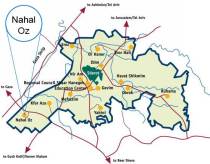This was originally posted at CiF Watch
Be it the NYT’s Thomas Friedman, NIF’s Ben Murane, Jonathan Freedland - or even such overtly hostile anti-Zionist voices such as Walt and Mearsheimer or the editors at the Guardian - a common paternalistic refrain from Israel’s obsessive critics is that they don’t dislike Israel at all, but are merely acting out of ‘tough love’ towards a Jewish state which continually pursues policies that aren’t in their own best interest.
So, as a citizen of Israel, I respectfully ask my American Jewish friends who see their role as providing guidance to ‘save us from our ourselves’, to please show a bit of humility the next time you provide advice which will result in very real consequences that neither you, nor your family and loved ones, will have to burden.
Please avoid the hubris of telling my democracy, continually under siege by state and non-state actors who don’t disguise their malevolence towards us and rejection of our existence within any borders, what kind of risks we should take on the hope that our every peaceful gesture will be reciprocated in kind.
Kindly attempt to refrain from decidedly ahistorical assumptions, such as the belief that a cessation of construction in “East” Jerusalem or the West Bank (whatever your views on such communities beyond the Green Line) will necessarily be reciprocated with peace from our Palestinian neighbors.
While we appreciate a friendly debate with our diaspora supporters, please understand that it wasn’t diaspora Jews who saved Israel when multiple Arab armies sought Israel’s destruction on the day of its birth in 1948; nor in June 1967 when 500,000 Arab troops amassed along its borders, and Arab leaders assured rapturous crowds in Cairo, Damascus and Baghdad that the Jewish state’s end was near; nor when Arab armies launched a surprise attack in 1973 on the holiest day of the year.
It wasn’t diaspora Jews who, in 1976, launched a daring raid to save Jews (Israelis and non-Israelis) held hostage in Uganda, by Palestinian and German terrorists, from execution.
It wasn’t diaspora Jews who, in 2002, fought a bloody house to house battle in Jenin – where Palestinians used bombs, grenades, booby-traps and machine guns to turn the camp into a war zone - to root out a terrorist infrastructure responsible for scores of suicide bombings during the 2nd Intifada.
And, it wasn’t diaspora Jews who have had to absorb over 12,000 rockets fired from Gaza into Israel since 2002.
Like any democracy, Israel not only has a right to defend its citizens, but a moral obligation to protect its men, women and children from ongoing clear and present dangers.
The recent Israeli withdrawals from S. Lebanon and Gaza, 63 years of statehood – and certainly much of Jewish history – simply does not support this seemingly immutable belief in the efficacy of the assumption of good will.
Yes, we certainly seek (and sincerely appreciate) your moral support in our ongoing battle against enemies waging a relentless cognitive and military war against our nation, and respect those who genuinely empathize with our plight but merely differ with us on how to successfully defend ourselves from such an onslaught.
However, we are not children.
Respectfully, when engaging in such criticism please attempt to avoid the hubris of believing that you alone possess the sechel, wisdom, and moral understanding necessary for peace which has somehow eluded Israeli citizens, scholars and even the most dovish statesmen for nearly 64 years.
After leaving politics, Yosef ‘Tommy’ Lapid, an Israeli journalist, politician and Holocaust survivor (who died of cancer at the age of 77) was appointed to head the Yad VaShem Memorial for the six million Jews who perished in the Holocaust.
Six million of our dead speak to us from the earth. ‘We did not think’, they say to us, ‘that such a thing could come to pass. We trusted others’ benevolence…..We believed there was a limit to the madness. BY THE TIME WE AWAKENED FROM THESE DELUSIONS IT WAS TOO LATE.
Do not follow in our footsteps. THE ENLIGHTENED WORLD COUNSELS US TO COMPROMISE, TO TAKE CHANCES IN THE NAME OF PEACE. And we ask the enlightened world, on Holocaust and Heroism Remembrance DAY, WE ASK ALL THOSE WHO PREACH AND MORALIZE TO US; What will you do if we take chances and make sacrifices and put our trust in you – and then something goes wrong, WHAT WILL YOU DO THEN, ask our forgiveness. say, WE were wrong, SEND BANDAGES, Open orphanages for the children who survive? pray that our souls rise to heaven?
As Lapid asked, and as I urgently repeat, what will WE do if your most stubbornly held assumptions about peace in the Middle East are dead wrong?
We have little room for error, and there is no nobility in victimhood.
Adam Levick
Jerusalem, Israel













